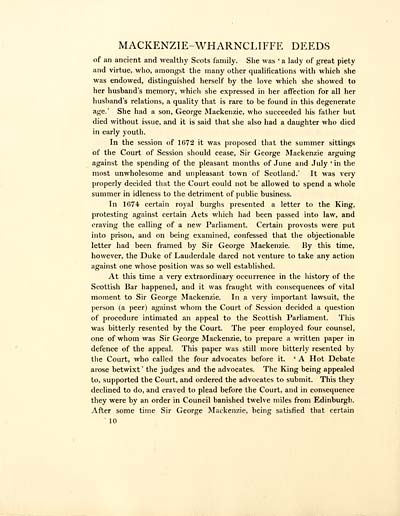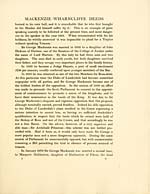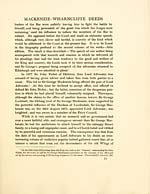Download files
Complete book:
Individual page:
Thumbnail gallery: Grid view | List view

MACKENZIE-WHARNCLIFFE DEEDS
of an ancient and wealthy Scots family. She was ' a lady of great piety
and virtue, who, amongst the many other qualifications with which she
was endowed, distinguished herself by the love which she showed to
her husband's memory, which she expressed in her affection for all her
husband's relations, a quality that is rare to be found in this degenerate
age.' She had a son, George Mackenzie, who succeeded his father but
died without issue, and it is said that she also had a daughter who died
in early youth.
In the session of 1672 it was proposed that the summer sittings
of the Court of Session should cease, Sir George Mackenzie arguing
against the spending of the pleasant months of June and July ' in the
most unwholesome and unpleasant town of Scotland.' It was very
properly decided that the Court could not be allowed to spend a whole
summer in idleness to the detriment of public business.
In 1674 certain royal burghs presented a letter to the King,
protesting against certain Acts which had been passed into law, and
craving the calling of a new Parliament. Certain provosts were put
into prison, and on being examined, confessed that the objectionable
letter had been framed by Sir George Mackenzie. By this time,
however, the Duke of Lauderdale dared not venture to take any action
against one whose position was so well established.
At this time a very extraordinary occurrence in the history of the
Scottish Bar happened, and it was fraught with consequences of vital
moment to Sir George Mackenzie. In a very important lawsuit, the
person (a peer) against whom the Court of Session decided a question
of procedure intimated an appeal to the Scottish Parliament. This
was bitterly resented by the Court. The peer employed four counsel,
one of whom was Sir George Mackenzie, to prepare a written paper in
defence of the appeal. This paper was still more bitterly resented by
the Court, who called the four advocates before it. ' A Hot Debate
arose betwixt' the judges and the advocates. The King being appealed
to, supported the Court, and ordered the advocates to submit. This they
declined to do, and craved to plead before the Court, and in consequence
they were by an order in Council banished twelve miles from Edinburgh.
After some time Sir George Mackenzie, being satisfied that certain
10
of an ancient and wealthy Scots family. She was ' a lady of great piety
and virtue, who, amongst the many other qualifications with which she
was endowed, distinguished herself by the love which she showed to
her husband's memory, which she expressed in her affection for all her
husband's relations, a quality that is rare to be found in this degenerate
age.' She had a son, George Mackenzie, who succeeded his father but
died without issue, and it is said that she also had a daughter who died
in early youth.
In the session of 1672 it was proposed that the summer sittings
of the Court of Session should cease, Sir George Mackenzie arguing
against the spending of the pleasant months of June and July ' in the
most unwholesome and unpleasant town of Scotland.' It was very
properly decided that the Court could not be allowed to spend a whole
summer in idleness to the detriment of public business.
In 1674 certain royal burghs presented a letter to the King,
protesting against certain Acts which had been passed into law, and
craving the calling of a new Parliament. Certain provosts were put
into prison, and on being examined, confessed that the objectionable
letter had been framed by Sir George Mackenzie. By this time,
however, the Duke of Lauderdale dared not venture to take any action
against one whose position was so well established.
At this time a very extraordinary occurrence in the history of the
Scottish Bar happened, and it was fraught with consequences of vital
moment to Sir George Mackenzie. In a very important lawsuit, the
person (a peer) against whom the Court of Session decided a question
of procedure intimated an appeal to the Scottish Parliament. This
was bitterly resented by the Court. The peer employed four counsel,
one of whom was Sir George Mackenzie, to prepare a written paper in
defence of the appeal. This paper was still more bitterly resented by
the Court, who called the four advocates before it. ' A Hot Debate
arose betwixt' the judges and the advocates. The King being appealed
to, supported the Court, and ordered the advocates to submit. This they
declined to do, and craved to plead before the Court, and in consequence
they were by an order in Council banished twelve miles from Edinburgh.
After some time Sir George Mackenzie, being satisfied that certain
10
Set display mode to:
![]() Universal Viewer |
Universal Viewer | ![]() Mirador |
Large image | Transcription
Mirador |
Large image | Transcription
Images and transcriptions on this page, including medium image downloads, may be used under the Creative Commons Attribution 4.0 International Licence unless otherwise stated. ![]()
| Histories of Scottish families > Ancient deeds and other writs in the Mackenzie-Wharncliffe charter-chest > (32) Page 10 |
|---|
| Permanent URL | https://digital.nls.uk/95523749 |
|---|
| Description | A selection of almost 400 printed items relating to the history of Scottish families, mostly dating from the 19th and early 20th centuries. Includes memoirs, genealogies and clan histories, with a few produced by emigrant families. The earliest family history goes back to AD 916. |
|---|

